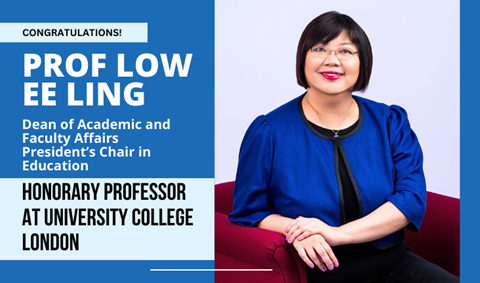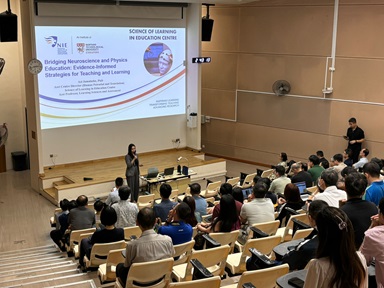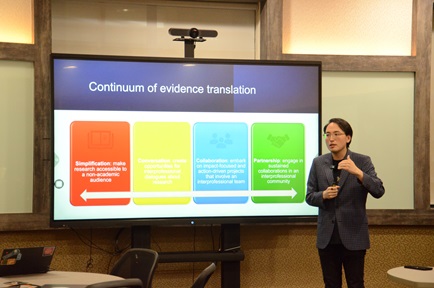UAE Embassy in Singapore Hosts High-Level Symposium on AI and the Future of Education in Partnership with ECAE and NIE NTU, Singapore
Singapore, 23 May 2025 – The UAE Embassy in Singapore, in partnership with, Emirates College for Advanced Education (ECAE) and the National Institute of Education, Nanyang Technological University (NIE NTU), Singapore, hosted a high-level symposium, titled “Reimagining the Future of Teaching & Learning in the Age of AI”, highlighting the growing cooperation between the UAE and Singapore in future-focused education. The event was graced by Ms Liew Wei Li, Director-General of Education at the Ministry of Education in the Republic of Singapore and H.E. Sulaiman, Assistant Undersecretary for Professional Development Sector, Ministry of Education in the UAE.
Held in Singapore, the event brought together senior policymakers, academics, and researchers to explore the transformative potential of artificial intelligence in education. The symposium explored key questions shaping the future of learning, including the evolving role of educators in the AI era and the design of education systems that prioritize student growth, equity, ethics, and professional excellence.
In his welcome address, His Excellency Jamal Abdullah Al Suwaidi, UAE’s Ambassador to Singapore, highlighted the longstanding relations between the two countries and their cooperation and strategic partnerships across multiple sectors, including education.
Dr. May Laith Al Taee, Vice Chancellor of ECAE, highlighted in her opening remarks the significance of the symposium in advancing ECAE’s mission to serve as a bridge between educational policy, research, and innovation. “This gathering reflects a shared commitment to shaping education systems that are technologically advanced and deeply human. At ECAE, we believe that global collaboration is essential to creating meaningful, scalable change, and our partnership with NIE is a powerful example of what can be achieved when values and vision align. She also emphasized the importance of the strategic approach adopted by the UAE and its leadership in the field of artificial intelligence, and the need to keep pace with global developments in this field and harness them to develop the country's educational workforce.”
A panel discussion brought together leading educators and academics, including: Professor Low Ee Ling, Dean, of Academic & Faculty Affairs and President’s Chair in Education at the NIE and Adjunct Professor at National University of Singapore; Professor David Pedder, Deputy Vice Chancellor, Academic at ECAE; Professor Shaljan Areepattamannil, Director, Office of Research, at ECAE; and Associate Professor Tan Seng Chee, Associate Dean, Professional & Leadership Development at the NIE; and moderated by Mr Paul Lincoln, Head, Visual and Performing Arts at the NIE.
Professor Low shared: “As AI transforms education, teacher education remains grounded in what truly matters. We stay values-anchored, student-centered, evidence-informed, and future-focused — principles that guide teachers to lead with heart, purpose, and professionalism. While AI can enhance how we teach, it cannot replace the human connection at the core of great teaching. These enduring anchors ensure that, beyond AI, teacher education continues to shape educators who are grounded, well prepared, and ready to thrive in an uncertain future”.
Associate Professor Tan explored how AI is reshaping the very foundations of pedagogy and advocated for learning designs that preserve human insight and creativity.
He pointed out how the rise of generative AI is challenging us to rethink the way we teach and learn, elaborating that “Using the framework of learning from, with, about, and beyond AI, it emphasizes that while AI can reshape education, enduring pedagogical principles must guide our journey, and holistic design considerations should be applied.” He further shared that “Especially in learning with AI, we must develop approaches that are timeless, rooted in human agency, insight, meaningful interaction, and knowledge creation capacity.”
Professor Pedder discussed the critical threshold where digital tools and AI genuinely enhance learning, while still nurturing the cognitive, emotional, and social growth essential to education. “The potential of AI to augment cognition, promote dialogue, expand access and equity, and inspire creativity and curiosity is immense,” he observed, adding that this perspective is reflected in ECAE’s National Educators Competency Framework, developed in collaboration with the UAE’s Ministry of Education. “By embedding AI as a cross-programmatic theme in its academic offerings, ECAE ensures that future educators engage with emerging technologies in an informed and ethical way,” he pointed out. This strategy prepares educators to create inclusive, learner-centered environments equipped for the challenges of a rapidly evolving educational landscape.
Professor Areepattamannil explained how natural language and predictive models can track student engagement, achievement, and well-being in real time to support informed decisions on interventions, budgets, and curricula. “It highlights the importance of equity safeguards like bias audits, privacy, and transparency,” he pointed out, emphasizing the need for ongoing impact evaluation that upholds human judgment and inclusive values in education systems.
The symposium concluded with a speech by Professor Liu Woon Chia, Director of the NIE, who underscored the strength of the strategic partnership with the UAE in education. She remarked, ‘This collaboration supports the global shift towards agile, innovative, and AI-driven education systems that are more inclusive and integrated.’ She called for greater joint efforts in policymaking and strategic development to keep pace with the rapidly evolving educational landscape. Closing her address, she reflected, ‘While technology may shape the tools of tomorrow, the heartbeat of education remains profoundly human.’
The event came on the heels of a strategic agreement between ECAE and NIE last year under the second phase of the ECAE-initiated Strategic Framework for Educational Excellence, aimed at advancing the UAE’s educational sector by preparing educators as global leaders grounded in Emirati values and the nation’s unique educational priorities. Through quality programs, innovative research, and strategic partnerships, the framework emphasizes the development of future-ready educators capable of implementing forward-thinking teaching methods and contributing to local and international educational standards.


-(1).tmb-listing.png?Culture=en&sfvrsn=1e533225_1)

.tmb-listing.jpg?Culture=en&sfvrsn=7af56b8b_1)

